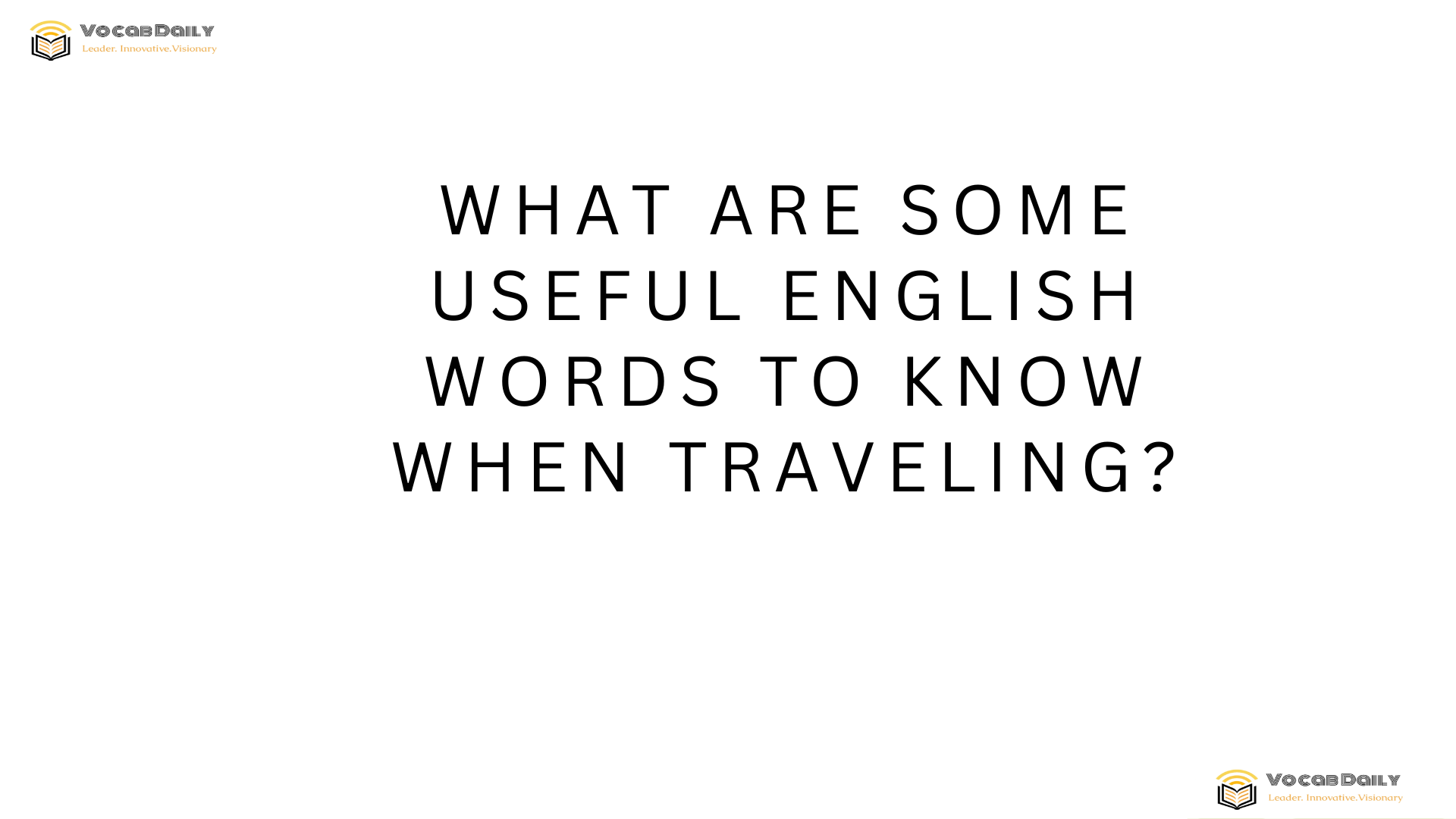What are some useful English words to know when traveling
Essential Greetings and Polite Expressions
When traveling to English-speaking countries or places where travelers commonly use English as a bridge language, knowing some basic greetings and polite expressions can make interactions smoother and more pleasant. Simple words and phrases like “hello,” “please,” “thank you,” “excuse me,” and “sorry” go a long way in showing respect and building rapport.
For example, saying “hello” or “good morning” can brighten someone’s day and open opportunities for kind assistance. Using “please” when asking for directions or help signals politeness, while “thank you” expresses gratitude. “Excuse me” is useful to get someone’s attention without being rude, and “sorry” can be helpful if you accidentally bump into someone or need to apologize.
Basic Travel Directions and Locations
Knowing English words related to directions and locations is vital for navigating new places confidently. Words such as “left,” “right,” “straight,” “near,” “far,” “intersection,” “crosswalk,” “street,” and “stop” are commonly used by locals and on signage.
If you need to ask where something is, phrases like “Where is the restroom?” or “How do I get to the train station?” are essential. Also, understanding responses involving these direction words helps you follow instructions effectively.
Transportation Vocabulary
Traveling often involves different modes of transport, so knowing relevant English terms can assist in planning and using public or private transit. Words such as “bus,” “train,” “taxi,” “airport,” “ticket,” “platform,” “schedule,” “departure,” and “arrival” are commonly encountered in travel scenarios.
For example, when purchasing tickets, understanding terms like “one-way” and “round-trip” prevents confusion and ensures you get the right pass. Also, phrases such as “What time does the next bus leave?” or “Where is the taxi stand?” help you navigate easily.
Accommodation-Related Words
Finding a place to stay comfortably requires understanding and using key accommodation terms. Words like “hotel,” “hostel,” “reservation,” “room,” “check-in,” “check-out,” “key,” “bed,” and “bathroom” are typical in lodging contexts.
When speaking with accommodation staff, you might ask, “Do you have a room available?” or “What time is check-out?” Knowing these words and phrases ensures smoother communication during your stay, helping avoid misunderstandings or inconveniences.
Food and Dining Vocabulary
Trying new foods is one of the joys of traveling. Knowing food-related words enhances your experience at restaurants, markets, or cafes. Terms like “menu,” “breakfast,” “lunch,” “dinner,” “vegetarian,” “allergy,” “bill,” “tip,” “water,” and “waiter/waitress” are frequently used.
If you have dietary restrictions, it’s especially important to communicate clearly using words like “allergy” or “vegan.” Simple questions such as “Can I see the menu?” or “Could I have the bill, please?” make dining out much easier and friendlier.
Emergency and Health Words
Being prepared with vocabulary related to emergencies and health matters is crucial for any traveler. Knowing words like “help,” “police,” “hospital,” “doctor,” “pharmacy,” “medicine,” “injury,” and “emergency” can make a big difference in urgent situations.
For example, if you need immediate assistance, shouting “Help!” or asking “Where is the nearest hospital?” can speed up aid. Carrying a list of common symptoms or medical conditions in English might also be useful when visiting clinics or pharmacies.
Shopping and Currency Terms
Shopping while traveling is often a popular activity. Understanding terms related to buying items, money, and prices helps in any marketplace or store. Words such as “price,” “cost,” “sale,” “cash,” “credit card,” “change,” “receipt,” “discount,” “size,” and “fitting room” are essential.
Questions like “How much does this cost?” or “Can I pay by credit card?” help adults navigate transactions confidently. Being able to ask for the receipt or understand discounts ensures fair shopping experiences.
Weather and Clothing
Knowing weather and clothing vocabulary helps you pack appropriately and dress comfortably for your destination. Words such as “rain,” “sunny,” “cloudy,” “cold,” “hot,” “jacket,” “umbrella,” “shoes,” and “hat” are practical in conversation and understanding forecasts.
You can ask, “What will the weather be like tomorrow?” or say, “I need to buy a jacket.” These words prepare you to adapt to different climates, making your trip more enjoyable.
Time and Dates
Time-related words are vital for scheduling and planning your activities. Common terms include “hour,” “minute,” “day,” “week,” “month,” “today,” “tomorrow,” “yesterday,” “morning,” “afternoon,” “evening,” and “night.”
Understanding and using phrases like “What time does the museum open?” or “My flight leaves at noon” helps organize your itinerary without stress.
Cultural and Social Interaction Words
Travel also involves engaging with different cultures and social settings. Knowing polite phrases and social cues in English can help you make friends and enjoy local experiences. Words like “friend,” “family,” “celebration,” “tradition,” “festival,” and “language” support meaningful interactions.
Using expressions such as “Nice to meet you” or “Where are you from?” can spark conversations and enhance your cultural understanding, enriching your travel experience.
Useful Questions to Ask
One of the most important skills is asking questions in English. Starting with words like “What,” “Where,” “When,” “Who,” “How,” and “Why” helps gather the information you need. Some everyday travel questions include:
- What time does the bus arrive?
- Where is the nearest ATM?
- How much does this ticket cost?
- When does the museum close?
- Who can I contact in case of emergency?
- Why is this area important?
Practicing these questions prepares you to interact confidently and find solutions during your trip.
Also check out VocabDaily workbook collections.

Leave a Reply